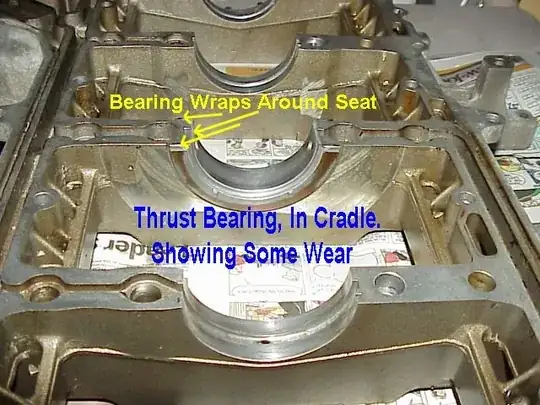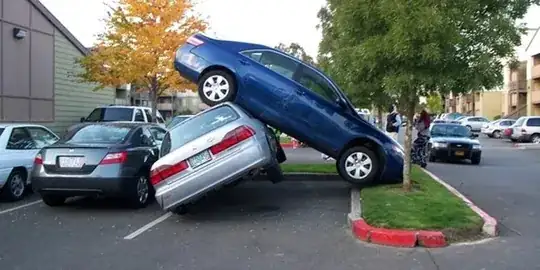As I know, clutch pressing and neutral gear both disengage the engine from wheels. So will it matter if I do not press the clutch if I start in neutral?
11 Answers
It depends on the specific vehicle. Many modern standard transmission cars in the US have a clutch pedal sensor that will not allow you to start the vehicle if the pedal isn't fully depressed. You'll turn the key and nothing will happen.
I've had older vehicles that preceded this sensor that could move the vehicle if the clutch was engaged and the transmission in gear. This was cited as an emergency way to move the vehicle (e.g., if you stall on railroad tracks).
- 24,537
- 11
- 85
- 166
Being from Canada, I feel compelled to mention that if you do not depress the clutch while starting when it is at all cold out (let's say < 0 Celsius) you will notice the starter motor labouring significantly as it spins both the cold engine and the cold transmission. If it is really cold, your battery may not have enough power to start the car at all in this situation.
This makes sense if you have ever tried to pour cold transmission oil; it is quite a bit more viscous than motor oil, and acts about like honey in cold temperatures.
This would be less of an issue when it is warm out, or if you are using synthetic transmission oil, but still is unnecessary wear on your starter and not a good habit.
- 422
- 3
- 5
I drive an old landrover with a 202" straight six. And I was taught to start in neutral with the clutch out. This means the starter has to spin more mass, but that mass will help the engine turn over the top (pistons at either end of their throw)
To be honest it doesn't seem to make a difference either way in my experience.
However - Starting with the clutch underwater should be done in neutral. I can feel the plates sliding and the friction point becomes a guess. If your 4WD has stalled then its totally best to start with the gearbox in neutral and the clutch out, to keep the clutch plates drier, which may be necessary for exiting up out of the water. This one comes from personal experience.
- 3,163
- 3
- 21
- 37
In my opinion, this is a good practice to adopt. Pressing the clutch means that you disconnect the engine from the gearbox. Consequently, the power needed from the starter motor will be less. This will not only result to less wear out of the starter, but also requires less current from the battery (for cases where the battery condition is degraded).
In cases when the weather is cold, the gearbox oil gets thicker and the battery efficiency is reduced, this practice can save a lot of energy during engine start.
Now for the practical part: There will be times when the car will be -accidentally left- in gear (other than neutral). Pressing the clutch at start-up will prevent the car from moving (which at times can result even to a small collision).
So, the short answer to this question is a "definite yes"!
- 151
- 1
- 3
In some cars (see Bob Cross reply) you really need to press the clutch pedal otherwise a sensor will prevent the car from starting.
But you should press the clutch pedal in most situations.
Reasons to press the clutch pedal:
- You avoid the car "jolt and halt" in case you left a gear engaged. This mistake may cause mechanical damage or to bump against another car (or a wall).
- Engine self-starter needs to move more gears, it's going to wear out sooner and to stress battery more.
- The self-starter is going to need more battery energy to move the various mechanics that stay connected if clutch pedal is up. This shows a lot of effect when the battery is old, partly discharged or your car has been sitting in the cold for some hours.
Less powerful engines tend to come with less powerful self starters. Starting them is more difficult if you leave the clutch pedal up.
Old, strained, badly setup (carburation etc.) engines and very cold engines get difficult to keep running during the first 30 seconds - 1 minute if clutch pedal is up. Old cars with less than perfect lubrication or gears and ball bearings slight mis-aligment audibly feel the difference between holding the pedal up or down, the RPM audibly changes too.
Only reason I have found to start an engine with engaged clutch and gear is to take your car to repair when the clutch pump(s) or wire (old cars) break or get stuck. Some good car drivers manage to switch gears with a broken clutch but in general you are better to try and take the car to a nearby repair ASAP (in case you can't get it taken by a tow truck).
- 121
- 1
I'd be surprised if any mass production car sold today (in the US?) didn't have a clutch interlock. You have to press the clutch pedal to the floor to trigger a sensor to allow the starter to engage.
So to answer your question, if you don't have an interlock and are in neutral, it won't technically matter. Practically, however...
Pros:
- You will save some wear on your engine's thrust bearing. But we're talking negligible even in the long term with most cars. Trouble with this is relegated to older vehicles with sub-par thrust bearings.
Cons:
- You might jerk the car forward/backward and run into people/things.
To me the cons outweight the pros.
- 4,149
- 23
- 43
There are two points which could cause your car to move if you start the engine: the clutch failing to disengage when you step on the pedal and the transmission failing to come out of gear when the lever is moved into a neutral position. Disengaging the clutch is a hedge against transmission failure and putting the transmission in neutral is a hedge against clutch failure. The chances of both failing at the same time are very small, so doing both considerably reduces the odds of having the car move unexpectedly.
This is even important on cars that have interlock switches because the switches may indicate that everything is in a safe state even if the actual mechanical state of a failed clutch or transmission is different.
- 216
- 1
- 2
One Possible issue with pressing the clutch while cranking the engine is that some of the load on the clutch is transferred to the crank on most engines. On a small number of cars this side load on the crank before there is any oil pressure can cause early failure.
Quite rare though (only one I have heard of it happening on quite often was the old 3.2L V8 Maserati engine).
- 571
- 2
- 6
I always do that when starting and turning off the engine. It will prevent the car moving unexpectedly (if you forgot the car was actually in gear and not in neutral. Another thing worth consideration, mostly for modern diesel cars (but also modern, turbo charged petrol cars) fitted with Duel Mass Flywheel, is that pressing the clutch while starting the engine reduces the pressure on the wheel which should make it last longer. This is particularly important, taking into account the cost of replacing a DMF.
- 109
- 1
"Manual transmission" is in the question's tags: for such transmissions, you don't need to press the clutch pedal, if you are about to start the car in neutral. With manual transmissions you "always" should start you car in neutral!
Pressing the clutch pedal while cranking is possible, but it will add more extra wear to the clutch system, more load to the crankshaft and bearing since oil isn't pumping yet. As a rule: pedals (any of them) should be pressed when utterly necessary :) Keep your feet out of them as much as possible, except for gassing obviously. Press clutch, press break ONLY as needed.
- 3,376
- 4
- 22
- 43
In the United Kingdom, doing so will normally result in you failing your driving test. :-)
In a vehicle without automatic transmission, if you switch on the ignition the vehicle WILL move if it has accidentally been left in gear. It will lurch forwards - or backwards - violently, without warning, potentially causing injury to pedestrians and/or damage to adjacent vehicles.
And if you have not depressed the clutch, you normally cannot tell whether the vehicle's gearbox has been left in neutral or is actually in gear. Bear in mind that manual transmissions, unlike automatics, do not have any visible label indicating the position of the transmission - there is no label marked 'park' - so how can you tell that the transmission is in neutral?
Sometimes the handbrake will hold a vehicle stationary long enough for the engine to stall, if you are lucky. But if the handbrake is off or faulty, and the vehicle is in gear, the vehicle will move.
In the UK, there are various criminal offences you can commit in this situation, depending on how unlucky you are, including driving without due care and attention, dangerous driving, and causing death by careless or dangerous driving.
- 113
- 1

